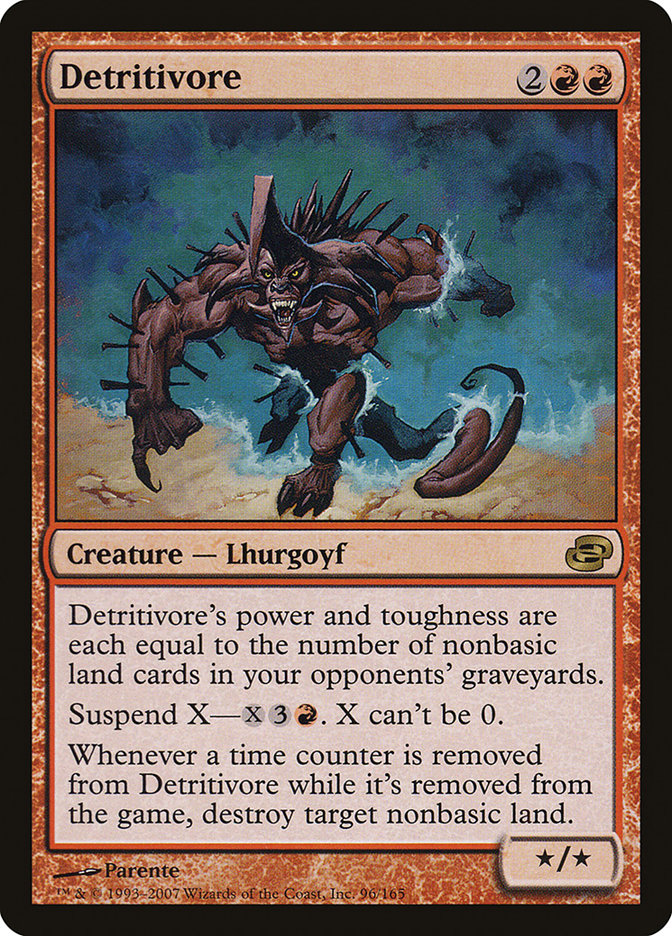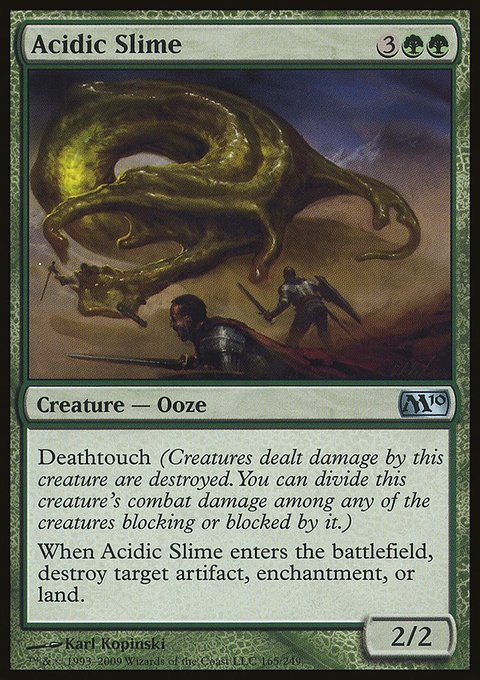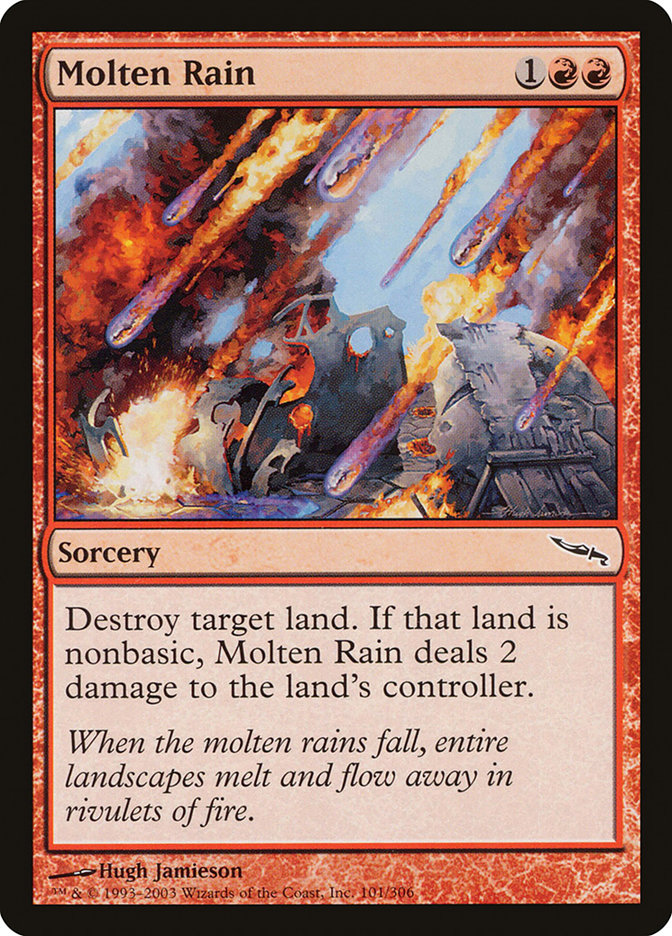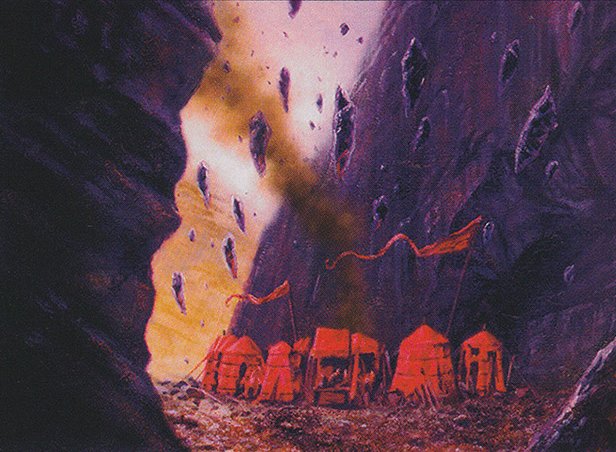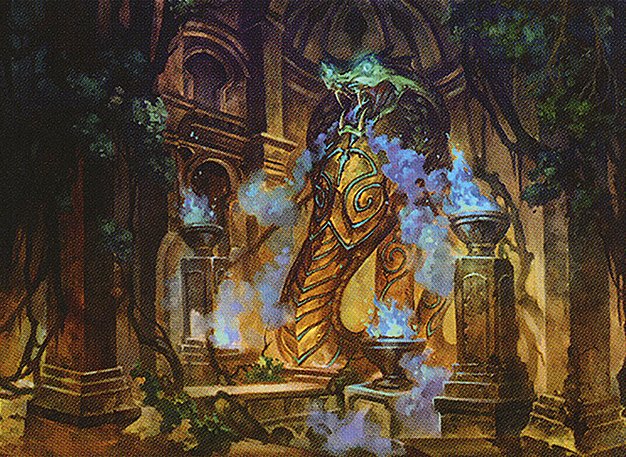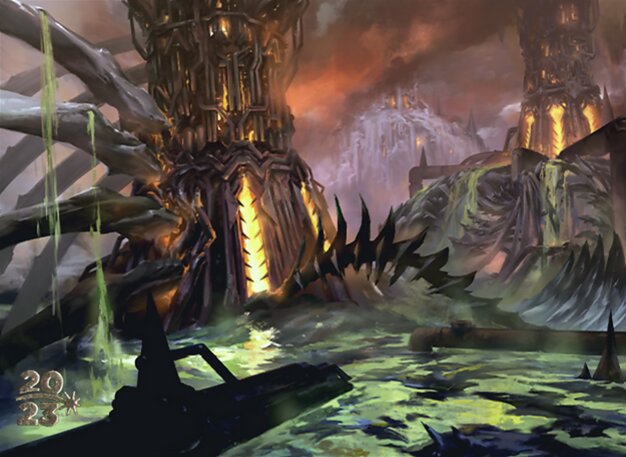Detritivore MTG Card
| Mana cost | |
| Converted mana cost | 4 |
| Rarity | Rare |
| Type | Creature — Lhurgoyf |
| Abilities | Suspend |
| Released | 2007-02-02 |
| Set symbol | |
| Set name | Planar Chaos |
| Set code | PLC |
| Power | * |
| Toughness | * |
| Number | 96 |
| Frame | 2003 |
| Layout | Normal |
| Border | Black |
| Illustred by | Paolo Parente |
Key Takeaways
- Detritivore offers continuous card advantage via its repeatable land destruction over time.
- Its suspend feature means a slower start but leads to near-instant disruption of mana bases.
- Despite its power, specific mana costs and higher suspend cost limit its deck inclusion.
Text of card
Detritivore's power and toughness are each equal to the number of nonbasic land cards in your opponents' graveyards. Suspend X—. X can't be 0. Whenever a time counter is removed from Detritivore while it's removed from the game, destroy target nonbasic land.
Card Pros
Card Advantage: Detritivore’s repeatable land destruction becomes a continuous card advantage over time. In a long game, it systematically reduces the resources available to the opponent, potentially leaving them unable to cast spells.
Resource Acceleration: By removing lands from the game, Detritivore can accelerate your strategy indirectly. With fewer lands to work with, your opponent may struggle to maintain pace, effectively giving you the upper hand.
Instant Speed: Although Detritivore itself is not an instant, its suspend ability ensures that it operates at an almost instant-like speed. Once it’s set up, it dismantles the opponent’s mana base at the beginning of your upkeep unexpectedly, which can catch your opponent off-guard and disrupt their plans.
Card Cons
Discard Requirement: Playing Detritivore comes with the caveat of having to suspend it, which means forgoing immediate impact on the board. This delay can be strategically limiting, especially when facing fast-paced decks that capitalize on quick plays.
Specific Mana Cost: Detritivore’s casting cost is quite specific, demanding both red and generic mana. This requirement may restrict its seamless inclusion in multicolored decks, particularly those not heavily skewed towards red mana sources.
Comparatively High Mana Cost: With its suspend cost anchored at a base of three mana, Detritivore’s effectiveness is diminished when considering the card’s comparative value against other land destruction or control options. Additionally, the total mana to unsuspend could add further strain on your mana allocation, as more pressing threats or plays could arise.
Reasons to Include in Your Collection
Versatility: Detritivore is a card with a dynamic role in various deck types, fitting perfectly into strategies that capitalize on land destruction or graveyard synergy. Its scalability with the suspend mechanic allows for flexibility in different game phases.
Combo Potential: This creature pairs well with cards that manipulate the number of lands on the battlefield, or those that grant benefits when your own lands are sent to the graveyard, unlocking new levels of strategic play.
Meta-Relevance: In environments where land-heavy or non-basic land reliant decks are prevalent, Detritivore can serve as a tactical asset, disrupting opponents’ mana bases and giving you a significant advantage in the game.
How to Beat Detritivore
Detritivore is an intriguing card in Magic: The Gathering, known for its potential to dismantle nonbasic land cards during the upkeep phase. It’s quite a challenge for decks relying on a diverse mana base. However, to counter this card effectively, players should consider strategies that either negate the Detritivore’s abilities or remove it from the board before it can disrupt their land configuration.
One efficient tactic is to focus on instant-speed removal spells, which can eliminate the Detritivore before the land destruction ability triggers. Keeping cards like Path to Exile or Rapid Hybridization at the ready ensures that as soon as it hits the battlefield, it can be dealt with. Another approach is to employ graveyard shuffle effects like those from Elixir of Immortality, which can recycle your graveyard back into your library, negating the Detritivore’s suspend-triggered land destruction.
Lastly, creating a deck with an abundance of basic lands minimizes the Detritivore’s impact, making it less of a threat. So, while it has the capability to control the pace of the game, strategic planning and promptly responding to it can neutralize its advantage, leaving your opponent with a less effective tool in their arsenal.
Cards like Detritivore
Detritivore stands as an intriguing creature card within the vast array of options in Magic: The Gathering. Its key feature, the land destruction ability, makes it a parallel to cards like Acidic Slime. Both are capable of targeting lands, but Detritivore offers a different approach by suspending and slowly chipping away at nonbasic lands turn after turn. Whereas Acidic Slime destroys a target land upon entering the battlefield, giving an immediate but once-off effect.
Molten Rain shares ground with Detritivore in the nonbasic land disruption theme. Like Detritivore, it is a strategy to unsettle opponents’ mana bases, yet Molten Rain accomplishes this through a direct and immediate two damage to the opponent upon successful land destruction. In the universe of red land removal spells, Detritivore offers a persistent threat and the potential for multiple land destructions over time. Meanwhile, Molten Rain provides instant satisfaction with additional burn to an opponent’s life total.
When evaluating the versatility and recurring impact of these red spells, Detritivore can be a game-long nuisance for opponents, especially in formats where nonbasic lands are abundant. This makes it a valuable card to consider for players who enjoy a deck with a strategic dismantling theme.
Where to buy
If you're looking to purchase Detritivore MTG card by a specific set like Planar Chaos, there are several reliable options to consider. One of the primary sources is your local game store, where you can often find booster packs, individual cards, and preconstructed decks from current and some past sets. They often offer the added benefit of a community where you can trade with other players.
For a broader inventory, particularly of older sets, online marketplaces like TCGPlayer, Card Kingdom and Card Market offer extensive selections and allow you to search for cards from specific sets. Larger e-commerce platforms like eBay and Amazon also have listings from various sellers, which can be a good place to look for sealed product and rare finds.
Additionally, Magic’s official site often has a store locator and retailer lists for finding Wizards of the Coast licensed products. Remember to check for authenticity and the condition of the cards when purchasing, especially from individual sellers on larger marketplaces.
Below is a list of some store websites where you can buy the Detritivore and other MTG cards:
- eBay
- TCG Player
- Card Kingdom
- Card Market
- Star City Games
- CoolStuffInc
- MTG Mint Card
- Hareruya
- Troll and Toad
- ABU Games
- Card Hoarder Magic Online
- MTGO Traders Magic Online
See MTG Products
Legalities
Magic the Gathering formats where Detritivore has restrictions
| Format | Legality |
|---|---|
| Commander | Legal |
| Legacy | Legal |
| Modern | Legal |
| Oathbreaker | Legal |
| Vintage | Legal |
| Duel | Legal |
| Predh | Legal |
| Penny | Legal |
Rules and information
The reference guide for Magic: The Gathering Detritivore card rulings provides official rulings, any errata issued, as well as a record of all the functional modifications that have occurred.
| Date | Text |
|---|---|
| 2007-02-01 | The triggered ability is mandatory. If no other player has any nonbasic lands on the battlefield, you must target one of your own. |
| 2021-06-18 | A creature cast using suspend will enter the battlefield with haste. It will have haste until another player gains control of it. (In some rare cases, another player may gain control of the creature spell itself. If this happens, the creature won’t enter the battlefield with haste.) |
| 2021-06-18 | As the second triggered ability resolves, you must cast the card if able. You must do so even if it requires targets and the only legal targets are ones that you really don’t want to target. Timing permissions based on the card’s type are ignored. |
| 2021-06-18 | Cards exiled with suspend are exiled face up. |
| 2021-06-18 | Exiling a card with suspend isn’t casting that card. This action doesn’t use the stack and can’t be responded to. |
| 2021-06-18 | If an effect refers to a “suspended card,” that means a card that (1) has suspend, (2) is in exile, and (3) has one or more time counters on it. |
| 2021-06-18 | If the card has in its mana cost, you must choose 0 as the value of X when casting it without paying its mana cost. |
| 2021-06-18 | If the first triggered ability of suspend (the one that removes time counters) is countered, no time counter is removed. The ability will trigger again at the beginning of the card’s owner’s next upkeep. |
| 2021-06-18 | If the second triggered ability is countered, the card can’t be cast. It remains exiled with no time counters on it, and it’s no longer suspended. |
| 2021-06-18 | If the spell requires any targets, those targets are chosen when the spell is finally cast, not when it’s exiled. |
| 2021-06-18 | If this is suspended, then when the last time counter is removed from it, both its triggered ability and the “cast this spell” part of the suspend ability will trigger. They can be put on the stack in either order. |
| 2021-06-18 | If you can’t cast the card, perhaps because there are no legal targets available, it remains exiled with no time counters on it, and it’s no longer suspended. |
| 2021-06-18 | If you cast a card “without paying its mana cost,” such as with suspend, you can’t choose to cast it for any alternative costs. You can, however, pay additional costs. If the card has any mandatory additional costs, you must pay those if you want to cast the card. |
| 2021-06-18 | Suspend is a keyword that represents three abilities. The first is a static ability that allows you to exile the card from your hand with the specified number of time counters (the number before the dash) on it by paying its suspend cost (listed after the dash). The second is a triggered ability that removes a time counter from the suspended card at the beginning of each of your upkeeps. The third is a triggered ability that causes you to cast the card when the last time counter is removed. If you cast a creature spell this way, it gains haste until you lose control of that creature (or, in rare cases, you lose control of the creature spell while it’s on the stack). |
| 2021-06-18 | The mana value of a spell cast without paying its mana cost is determined by its mana cost, even though that cost wasn’t paid. |
| 2021-06-18 | When the last time counter is removed, the second triggered ability of suspend (the one that lets you cast the card) triggers. It doesn’t matter why the last time counter was removed or what effect removed it. |
| 2021-06-18 | You are never forced to activate mana abilities to pay costs, so if there is a mandatory additional mana cost (such as from Thalia, Guardian of Thraben), you can decline to activate mana abilities to pay for it and hence fail to cast the suspended card, leaving it in exile. |
| 2021-06-18 | You can exile a card in your hand using suspend any time you could cast that card. Consider its card type, any effects that modify when you could cast it (such as flash) and any other effects that stop you from casting it (such as from Meddling Mage’s ability) to determine if and when you can do this. Whether you could actually complete all steps in casting the card is irrelevant. For example, you can exile a card with suspend that has no mana cost or that requires a target even if no legal targets are available at that time. |
